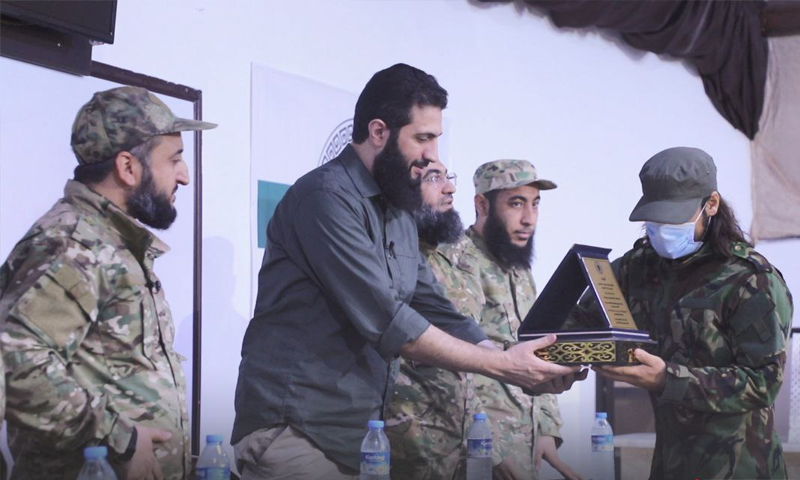Enab Baladi – Ali Darwish
The US-led Global Coalition to Defeat ISIS has concentrated its attacks against jihadist leaders from the Guardians of Religion Organization (GRO) in northwestern Syria, besides other independent jihadists by using smart missiles launched from drones or warplanes.
Since June 2020, six jihadist commanders from the GRO (the Syrian branch of al-Qaeda) were killed by the Coalition’s attacks, which sometimes aimed at top leaders in the group. Nevertheless, there has been no targeting against the Hayat Tahrir al-Sham (HTS), the influential force in Idlib governorate and parts of the western Aleppo countryside.
The HTS is included in the United Nations Security Council (UNSC)’s terrorist list, as are the GRO, al-Qaeda, and other local, regional, and international jihadist groups.
The HTS first emerged in Syria at the end of 2012, under the name of the al-Nusra Front for the People of the Levant. The HTS was an affiliate of al-Qaeda and the Islamic State (IS), the most prominent jihadist groups on the world stage, but later HTS announced its independence from all jihadist groups, presenting itself as a local Syrian force.
“The targeting of jihadist leaders is based on identity, not faction”
With each targeting of the GRO elements, eyes turn to the HTS, whose opponents accuse it of being behind the targetings, and that it is responsible for giving intelligence information to the Global Coalition to get rid of the GRO elements.
The accusations against HTS are triggered by two main factors, the first of which is HTS’ classification as a terrorist group, meaning that its leaders’ movements are more followed up and observed than that of the GRO leaders, who are more cautious and usually take extra security measures.
The second factor is the discord between HTS and the GRO, and the HTS prosecution and arrest of the GRO elements and leaders. This discord escalated into direct clashes in June 2020.
Nawar Shaaban, a researcher, and chief information officer at Omran Center for Strategic Studies, told Enab Baladi that anyone familiar with the case would say that HTS is dealing with the US and is responsible for the targetings, but, this is not necessarily true, as many elements and leaders of the GRO were previously members of HTS.
According to Shaaban, the US views the commanders it targeted as dangerous people regardless of their factional affiliation. These people were designated as terrorists when they were members of the HTS. Therefore, “The targeting is based on identity and not faction. Some of the targeted persons’ threat extends beyond their geographical location, regardless of their factions.”
If any party decides to hit the HTS, they will target its top leaders or destroy its economy, thus undermining the Syrian Salvation Government (SSG) and drying up its resources.
The SSG runs civil affairs in the HTS-controlled areas. The HTS is accused of meddling in all SSG’s governance details, which the two sides deny.
The HTS has arrested many jihadists from independent groups not included in its formations or members from the al-Fath al-Mubeen operations room, that includes HTS, the National Liberation Front (NLF), and the Jaysh al-Izza. The operation room is responsible for military actions in Idlib, the western Aleppo countryside, al-Ghab Plain in northern Hama, and the eastern hills and countryside of Latakia.
The majority of religious ideologues and commanders of the GRO were previous members of HTS and held sensitive positions. However, HTS’s independence from al-Qaeda and the structural changes it announced led to successive defections in its ranks in 2017, particularly within the current affiliated to al-Qaeda, which maintained its ideology.
Since the first half of last year, HTS has tightened the noose on jihadist groups and pursued those who defected from it and formed independent factions, including HTS’s former leader, the prince of Qalamoun and Rif Dimashq Abu Malik al-Tali.
It also went after internationally wanted leaders, particularly by Russia, such as Abu Salah al-Uzbeki. HTS arrested and released the jihadist leaders later last year, forcing their presence to diminish.
June 2020 witnessed clashes between HTS and the Be Steadfast operations room, which included prominent jihadist factions, primarily the GRO. The fighting ended with an agreement preventing the deployment of any roadblocks or military action against Syrian regime forces unless coordinated with the al-Fath al-Mubeen operations room.
International interests protect the HTS
Shaaban pointed out that some countries believe certain HTS local leaders are the ones controlling the security situation and that If they were targeted, security chaos would prevail; therefore, they try to avoid such a scenario.
Russia could benefit from targeting prominent leaders in HTS and creating a security crisis, but doing so would weaken HTS and leave a political vacuum in northwestern Syria waiting to be filled by Turkey, like what happened when top leaders in the Ahrar al-Sham movement were targeted, Shaaban said.
He added, If Russia targets HTS leaders, Turkey will invest more in Idlib’s security scene, preventing Russia from carrying out a military attack on the region in the future. Thus, the presence of HTS is currently serving Russia, as long as HTS continues its harmless policy towards Russia.
In September 2014, an explosion killed a number of prominent military leaders in the Ahrar al-Sham movement, most notably Hassan Abboud (Abu Abdullah al-Hamawi), the leader and founder of the movement, the top military leader Abu Talha al-Hamawi, the Shura Council member Abu Yazan al-Shami, the religious ideologues Abu Abdelmalek al-Sharei, in addition to Abu Ayman Taoum and Abu Zubeir al-Hamawi, who led the Ahrar al-Sham movement in Idlib and Hama.











